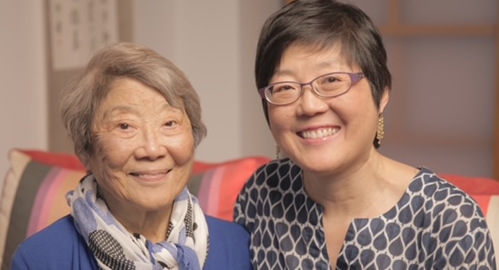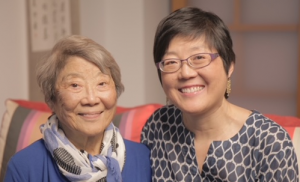
Monona A. Yin – A Mother’s Day Gift of Mercy
This will be the first Mother’s Day in 58 years that I have spent motherless. My amazing mom died in my Brooklyn home on July 20 after a six-year struggle with lymphoma.
My mother was a tough lady, having grown up in wartime China, where she survived and witnessed some of the worst atrocities of the 20th century. She came to the U.S. alone at 19, built a family and a life, then was tragically widowed at the age of 37 with two little kids. But she never buckled, never remarried. She and my father’s mother raised me and my brother in a secure and loving home. After retiring as a biochemist, she enjoyed 23 years of folk dancing, writing, and hanging out with her friends. We were sure she would go on this way at least to the age of ninety. It was therefore a terrible shock when she was diagnosed with late stage cancer in 2014, at the age of 82.
My mother worked very hard for the next six years to stay alive. She endured two courses of chemo, one of radiation, and over 25 transfusions in the last six months of her life. No one can say that she gave up.
My mother’s perspective on death was deeply informed by having cared for both of my grandmothers through long illnesses. One died peacefully with a minimum of suffering while the other lingered for two years in purgatory. My mother was haunted by her mother’s heartrending words, “I want to die but I cannot die. I want to live but I cannot live.”
Last year in April, as her body started to deteriorate, Mom asked me if we could move to New Jersey because medical aid in dying is legal there. Simply put, medical aid in dying allows a mentally capable, terminally ill patient with less than six months to live to request a prescription that would allow them to die peacefully. I spent the entire weekend looking into it but the logistics were insurmountable and she was already too weak. It seemed like a cruel joke that salvation lay just a few miles across the river.
By the end, Mom was just skin and bones. She struggled to breathe. She could no longer walk nor control her bodily functions. It pained her that her children had to witness her complete devastation. She had lived a good life, discharged all her duties faithfully. She couldn’t understand why she should be made to suffer to the bitter end. We don’t inflict that cruelty on the animals we love. Why then on the people we love most?
My mother did not find suffering to be ennobling, nor honorable. She regarded it as pure misery to fall about bit by bit until you have no quality of life nor desire to go on, even with the best palliative care – which we had and which I fully support.
Medical aid in dying relieves two kinds of suffering and I don’t think this is well understood: the first is the physical pain caused by terminal illnesses. This is the most common rationale cited for medical aid in dying. But the second is the psychic pain of fearing that you will made to suffer unnecessarily. For my mom, this psychic suffering started in 2014 and built to a crescendo in the last year of her life. Her increasingly desperate search for some measure of agency robbed us of precious time that my family would otherwise have enjoyed. She viewed medical aid in dying as an insurance policy that she might use only at the very end.
We don’t ask anyone else to choose — or even consider — medical in dying. It is absolutely an individual decision. We only ask that you not block people like my mother from having the option and the peace of mind that comes with it.
Medical aid in dying has been legal for a quarter-century, first in Oregon and now in 10 states and Washington DC. In all that time, there has not been a single documented case of abuse or coercion. These laws work exactly as intended around the country. Why should New Yorkers be deprived of the same end-of-life mercy as their neighbors in New Jersey and Vermont?
You may ask why medical aid in dying is a priority when our society is struggling with so much sickness, poverty, division, injustice, and violence. I would simply say, here is one form of suffering that we can end right now — together. If New York passes this law, people like my mother can have the peace they crave without hurting anyone else. To me, that would be a tremendous act of compassion, kindness and love toward the people who are already walking the last mile of life.
Monona A. Yin lives in Brooklyn.

